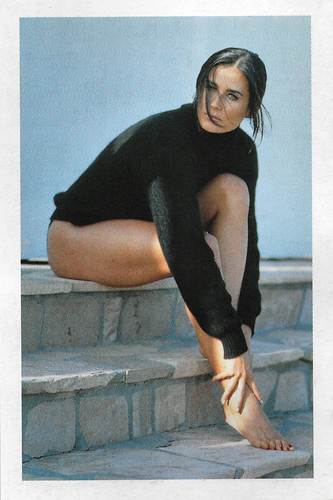
Belgian postcard in the 'De 50 mooiste vrouwen van de eeuw' (The 50 most beautiful women of the century) series by P-Magazine, no. 7. Photo: Lance Steadler / Outline.
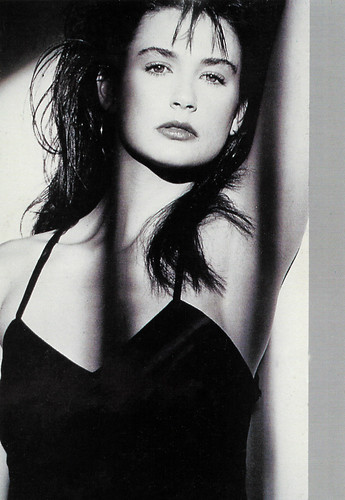
British postcard by Heroes Publishing Ltd, London, no. SPC 2572.
The girl of the Brat Pack
Demi Moore was born Demi Gene Guynes in Roswell, New Mexico in 1962. Her father, Air Force airman Charles Harmon, left her then 18-year-old mother Victoria (née King) after a two-month marriage and before Demi was born. When Demi Moore was three months old, her mother married Dan Guynes, a newspaper salesman, who she later saw as her real father.
The family moved frequently because of her stepfather's work, more than thirty times. Her stepfather committed suicide when Demi was fifteen, two years after divorcing her mother. A year later she dropped out of school. Her mother, Virginia Guynes, was arrested many times, including for arson and drunk driving. Moore broke off contact with her in 1990 but later reconciled with her shortly before she died of cancer in 1998 at the age of 54.
In 1979, three months before her 17th birthday, Demi met the rock musician Freddy Moore and they married in 1980. The marriage lasted four years. Moore signed with the Elite Modeling Agency and then enrolled in drama classes after being inspired by her next-door neighbour, 17-year-old German actress Nastassja Kinski. She appeared on the cover of the January 1981 issue of the French adult magazine Oui, taken from a photo session in which she had posed nude, and made her film debut with a brief role in the teen drama Choices (Silvio Narizzano, 1981).
In 1982, she played an investigative reporter in the hospital soap General Hospital (1982-1983). She celebrated her first cinema success in the romantic comedy Blame it on Rio (Stanley Donen, 1983) opposite Michael Caine. Around the same time, she became addicted to cocaine. Her big break came with the film St. Elmo's Fire (Joel Schumacher, 1985) with Rob Lowe and Emilio Estevez, to whom she was engaged for three years. Reportedly, she was fired by Schumacher during filming because of her drug abuse, after which she went to rehab and returned a week later. Interestingly, her character in the film, Jules, was also addicted to cocaine.
The film was a huge success, and Moore and her film counterparts were counted among the 'Brat Pack', a group of young actors with a promising future. Moore progressed to more serious material with the romantic comedy About Last Night... (Edward Zwick, 1986), co-starring Rob Lowe, which marked a positive turning point in her career. In 1987, she became even more famous when she married actor Bruce Willis.
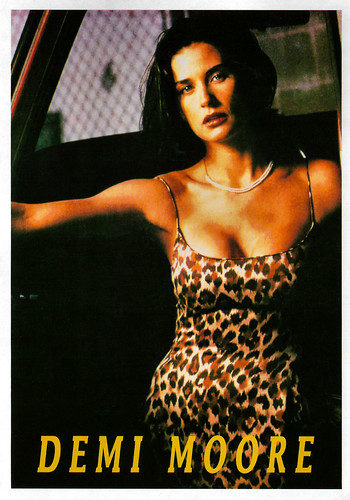
Turkish postcard by Laden, no. 98/191.
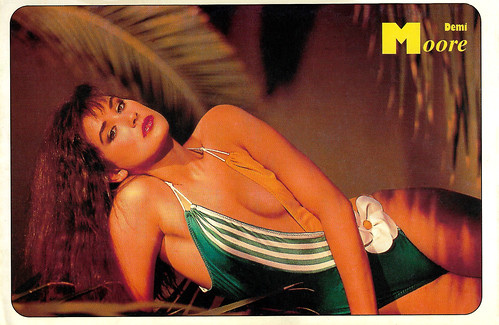
Italian postcard in the collection 'Le più belle del mondo' by Teletutto, no. 9.
A spot on the A-list
In 1990, Demi Moore co-starred with Patrick Swayze and Whoopi Goldberg in the highly successful fantasy Ghost (Jerry Zucker, 1990), for which she received a Golden Globe nomination. The love scene between Moore and Patrick Swayze that starts in front of a potter's wheel to the sound of 'Unchained Melody' became an iconic moment in film history and the film grossed over US$505 million at the box office.
'The highest-grossing film of that year' earned her a spot on the A-list and offered her many leading roles in films. The following year, she received a great deal of media attention when she appeared naked on the front page of Vanity Fair magazine while seven months pregnant. The front page was frequently imitated and parodied in the years that followed.
The next year, she starred in the blockbuster A Few Good Men (Rob Reiner, 1992), opposite Tom Cruise and Jack Nicholson. The following year, she scored another big film hit with the controversial Indecent Proposal (Adrian Lyne, 1993). In this film, a rich businessman (Robert Redford) presents a couple with financial problems (Moore and Woody Harrelson) with a dilemma: he gives the couple a million dollars if he can sleep with the woman.
Another blockbuster was the thriller Disclosure (Barry Levinson, 1994) with Michael Douglas. Moore produced and starred in a controversial miniseries for HBO called If These Walls Could Talk (1996), a three-part anthology about abortion alongside Sissy Spacek and Cher. Its screenwriter, Nancy Savoca, directed two segments, including one in which Moore played a widowed nurse in the early 1950s seeking a back-alley abortion.
For that role, Demi Moore received a second Golden Globe nomination as Best Actress. At the time, Moore was one of the highest-paid film actresses of all time, and she was the first actress to receive more than $10 million for a film role - $12.5 million for Striptease (Andrew Bergman, 1996).
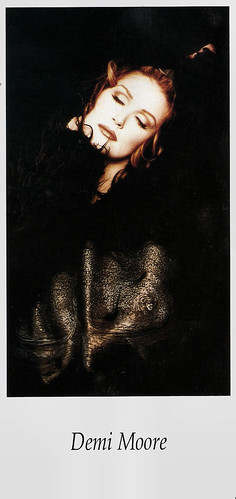
Belgian postcard by MultiChoice Kaleidoscope. Photo: Isopress / Outline / Steven Klein.
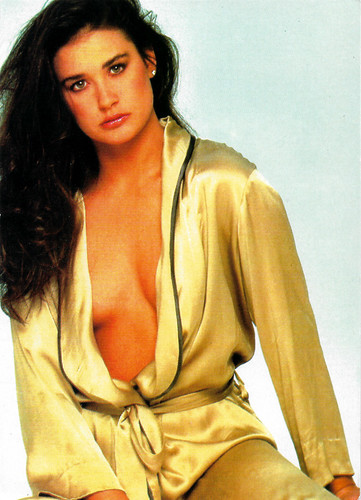
British postcard.
A Golden Raspberry
Demi Moore did not manage to keep up the success. Striptease (Andrew Bergman, 1996) opened to overwhelmingly negative reviews with Moore's performance being criticised and 'won' six Golden Raspberry Awards, including for worst film, worst actress and worst director. However, it was a moderate financial success, grossing US$113 million worldwide.
Moore also starred in the thriller The Juror (Brian Gibson, 1996). It was a box office bomb and was heavily panned by critics. Her two successes at the time were as the voice of the gipsy woman Esmeralda in Disney's animated film The Hunchback of Notre Dame (Kirk Wise, Gary Trousdale, 1996) and the voice of Dallas Grimes in the animated comedy Beavis and Butt-head Do America (Mike Judge, 1996), alongside her then-husband Bruce Willis.
When her long-cherished project G.I. Jane (Ridley Scott, 1997), for which the actress even shaved her head, turned out to be another flop, Demi Moore took a break in her acting career. As a producer, she did have a few successes with the three Austin Powers films, including Austin Powers: International Man of Mystery (Jay Roach, 1997).
Moore and Bruce Willis separated in 1998 and divorced in 2000. Together they have three children: Rumer Glen Willis (born 1988), Scout LaRue Willis (1991) and Tallulah Belle Willis (1994). In 2003, she had a much-discussed relationship with the sixteen-year-younger actor Ashton Kutcher, whom she married in 2005. That same year, she returned to the big screen by playing the villain in the sequel Charlie's Angels: Full Throttle (McG, 2005), starring Cameron Diaz, Drew Barrymore and Lucy Liu.
Since 2006, Demi has been the face and muse of cosmetics brand Helena Rubinstein. On-screen she could be seen in the ensemble cast of the acclaimed dramas Bobby (Emilio Estevez, 2006) and Margin Call (J. C. Chandor, 2011) with Kevin Spacey. Moore and Kutcher split in 2011 and their divorce was finalised in 2013. Incidentally, she appeared in films such as the black comedy Rough Night/Girls' Night Out (Lucia Aniello, 2017) starring Scarlett Johansson. In 2019, Moore released her book 'Inside Out' about her life, which reached the top spot on the New York Times Bestseller list. Since early 2022, Demi Moore has been in a relationship with Swiss celebrity chef Daniel Humm.
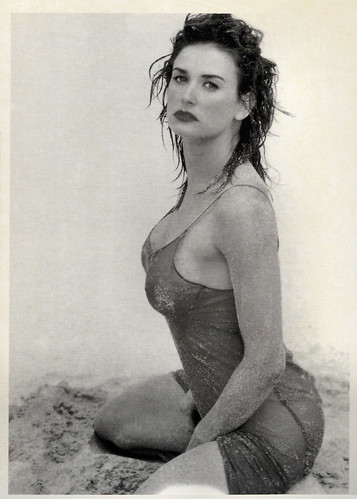
Canadian postcard by Canadian Postcard, no. A-284.
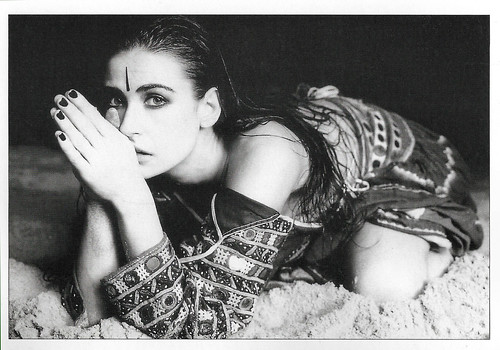
Italian postcard by CIAK. Photo: Dave Stewart / Colorific / G. Neri.
Sources: Wikipedia (Dutch, English and German), and IMDb.
No comments:
Post a Comment